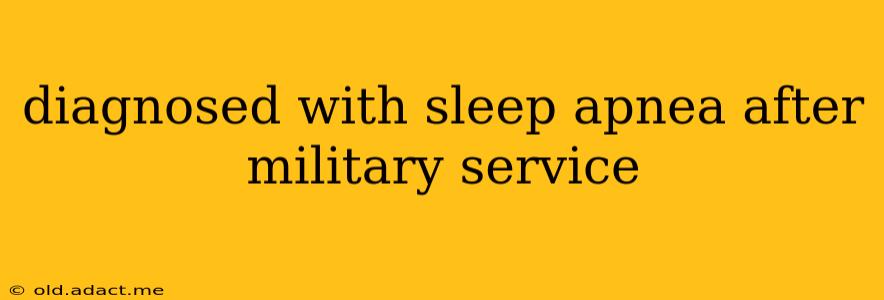Many veterans face unique health challenges after their service, and sleep apnea is unfortunately one of them. The demanding nature of military life, exposure to traumatic events, and potential access to less-than-ideal healthcare can contribute to the development or worsening of sleep apnea. This post explores the connection between military service and sleep apnea diagnoses, addresses common concerns, and offers pathways to effective treatment and support.
What is Sleep Apnea, and Why Might Veterans Be at Higher Risk?
Sleep apnea is a sleep disorder characterized by pauses in breathing during sleep. These pauses can last from a few seconds to minutes, and they can occur repeatedly throughout the night, disrupting restorative sleep. There are several types of sleep apnea, but the most common is obstructive sleep apnea (OSA), where the airway becomes blocked during sleep.
Several factors increase the risk of sleep apnea among veterans:
- Stress and Trauma: Military service often involves significant stress and exposure to traumatic events, both of which can contribute to sleep disorders. PTSD and other mental health conditions are strongly linked to sleep disturbances, including sleep apnea.
- Shift Work and Irregular Sleep Schedules: Frequent deployments, irregular work schedules, and constant readiness can severely disrupt the body's natural sleep-wake cycle, increasing the susceptibility to sleep apnea.
- Obesity: A higher body mass index (BMI) is a significant risk factor for sleep apnea, and some veterans may experience weight gain due to lifestyle changes after leaving the service.
- Neck Circumference: A larger neck circumference can narrow the airway, making it more prone to obstruction during sleep.
- Smoking and Alcohol Consumption: Both are known risk factors for sleep apnea, and unfortunately, some veterans may struggle with these habits after leaving service.
How Common is Sleep Apnea Among Veterans?
While precise statistics vary, research suggests a higher prevalence of sleep apnea among veterans compared to the general population. The specific numbers are difficult to pin down due to underdiagnosis and varying study methodologies. However, the risk factors outlined above strongly suggest a significant correlation.
What are the Symptoms of Sleep Apnea?
Recognizing the symptoms of sleep apnea is crucial for seeking timely diagnosis and treatment. Common symptoms include:
- Loud Snoring: Often interrupted by periods of silence.
- Daytime Sleepiness: Excessive daytime fatigue and difficulty staying awake.
- Morning Headaches: Frequent headaches upon waking.
- Difficulty Concentrating: Problems with focus and memory.
- Irritability and Mood Swings: Increased frustration and emotional lability.
- Waking Up Gasping for Air: Suddenly waking with a feeling of choking or shortness of breath.
How is Sleep Apnea Diagnosed?
A sleep study, either at home or in a sleep clinic, is typically required for a definitive diagnosis. This study monitors breathing, heart rate, and other physiological parameters during sleep to identify apnea events. Your physician may also conduct a physical exam and review your medical history.
What Treatment Options are Available for Sleep Apnea?
Treatment for sleep apnea varies depending on the severity of the condition. Common treatment options include:
- Continuous Positive Airway Pressure (CPAP): A CPAP machine delivers a continuous flow of air through a mask, keeping the airway open during sleep. This is often the first-line treatment for OSA.
- Oral Appliances: Custom-fitted mouthguards help to reposition the jaw and tongue, preventing airway obstruction.
- Lifestyle Changes: Weight loss, avoiding alcohol and smoking, and improving sleep hygiene can significantly improve sleep apnea symptoms.
- Surgery: In some cases, surgery may be considered to address anatomical issues contributing to airway obstruction.
What Resources are Available to Veterans Diagnosed with Sleep Apnea?
The Department of Veterans Affairs (VA) provides healthcare services, including diagnostic testing and treatment for sleep apnea. Veterans should contact their local VA healthcare facility to access these services. Support groups and online communities can also offer valuable peer support and information.
Can Sleep Apnea Affect My VA Disability Claim?
Sleep apnea can be a service-connected disability if it's linked to a condition or event that occurred during your military service. The VA will assess the claim based on evidence provided, including medical records and a thorough examination. It's crucial to consult with a VA disability lawyer or advocate to navigate the process effectively.
Are there Specific Challenges Veterans Face in Getting Diagnosed and Treated for Sleep Apnea?
Yes, veterans may face unique challenges in accessing timely diagnosis and treatment for sleep apnea. These challenges include:
- Delayed Access to Healthcare: Long wait times for appointments and tests can hinder timely diagnosis and treatment.
- Limited Awareness: A lack of awareness about sleep apnea and its connection to military service can lead to underdiagnosis.
- Stigma Associated with Mental Health: The stigma associated with mental health conditions, which often co-occur with sleep apnea, can prevent veterans from seeking help.
- Difficulties Navigating the VA System: The complexity of the VA healthcare system can be overwhelming for veterans seeking care.
By understanding the challenges and resources available, veterans diagnosed with sleep apnea after military service can navigate their health journey effectively and find the support they need to improve their sleep quality and overall well-being. Remember to seek help, advocate for your needs, and utilize the resources available to you.
